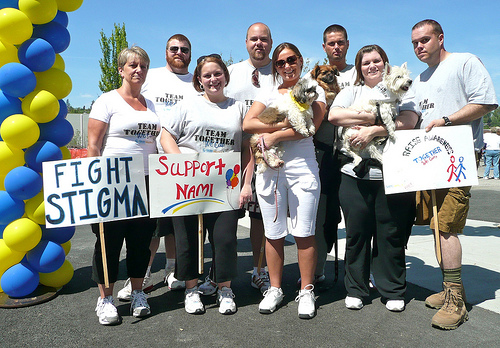Today I spoke with Ilisa Oman from the National Alliance on Mental Illness (NAMI). She has a big job there and uses math every day. I think it’s pretty cool that even though she isn’t terribly comfortable with math, she’s been able to become proficient in the math she needs to get her job done.
Can you explain what you do for a living?
NAMI Maryland is the state organization for the National Alliance on Mental Illness. My overall job is to make sure our messaging gets out there – erasing the stigma of mental illness and letting people know about all our programs. I have multiple roles in my position. I plan our major events such as our Walk, Annual Conference, Annual Meeting. In addition, I am responsible for all of our communications and outreach efforts such as creating our print and electronic newsletters, messaging through social media, and maintaining our website, flyers, webinars and press releases. And, I am responsible for some fundraising such as our annual campaign and our Walk. In addition to planning the logistics of that event, I am also responsible for soliciting sponsors and recruiting our fundraising teams/donors.
When do you use basic math in your job?
I use basic math to create my budgets when planning all of my events. An accurate budget is critical, particularly when working for a small, underfunded non-profit. I need to be cognizant of not only what things cost but also the related service charges and fees and be able to accurately calculate them. I also use math in determining our fundraising goals – percentages, where we are in relation to last year, and where we need to go.
Do you use any technology (like calculators or computers) to help with this math? Why or why not?
Calculators and Excel spreadsheets are my best friend. I wouldn’t dream of trying to create a budget without those tools.
How do you think math helps you do your job better?
As I mentioned, accurate budgets are critical for any event, but particularly for a small non-profit with little money. Math helps me do my job better because it keeps me on track. Seeing the numbers and an actual budget keeps me grounded and helps me realize the limits I have to work within when planning an event.
How comfortable with math do you feel? Does this math feel different to you?
Honestly, I am not comfortable with math. I never have been. It is probably harder for me to do this math, even with tools at my disposal, because the functioning of my organization depends on it.
What kind of math did you take in high school? Did you like it/feel like you were good at it?
I have never been good at math. My senior year in high school, most of my friends were taking pre-calc at a minimum. However, I took a class called “Pre-College Math” which basically was math to help me on the SAT.
Did you have to learn new skills in order to do the math you use in your job? Or was it something that you could pick up using the skills you learned in school?
The math I use is pretty basic. I just needed to become proficient in Excel.
Anything else you want to mention?
My daughter was diagnosed with a learning disability in math when she was in 2nd grade. Fortunately, in this day and age, there are so many resources out there to help people overcome such challenges, resources that I wish I had when I was young. Never be afraid to ask for help with math!
Want to know more? Please ask or comment below.
Photo Credit: chuck.taylor via Compfight cc


